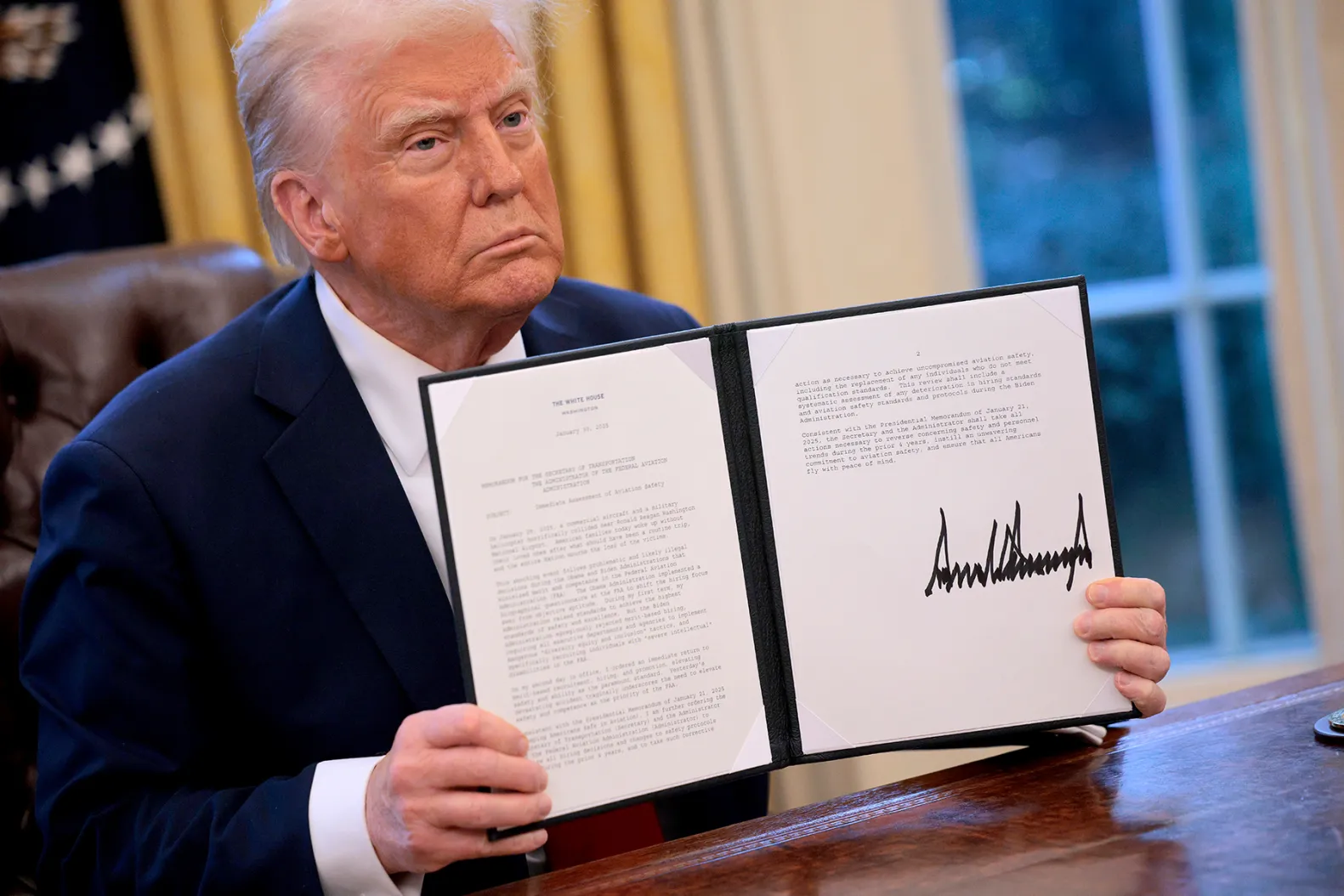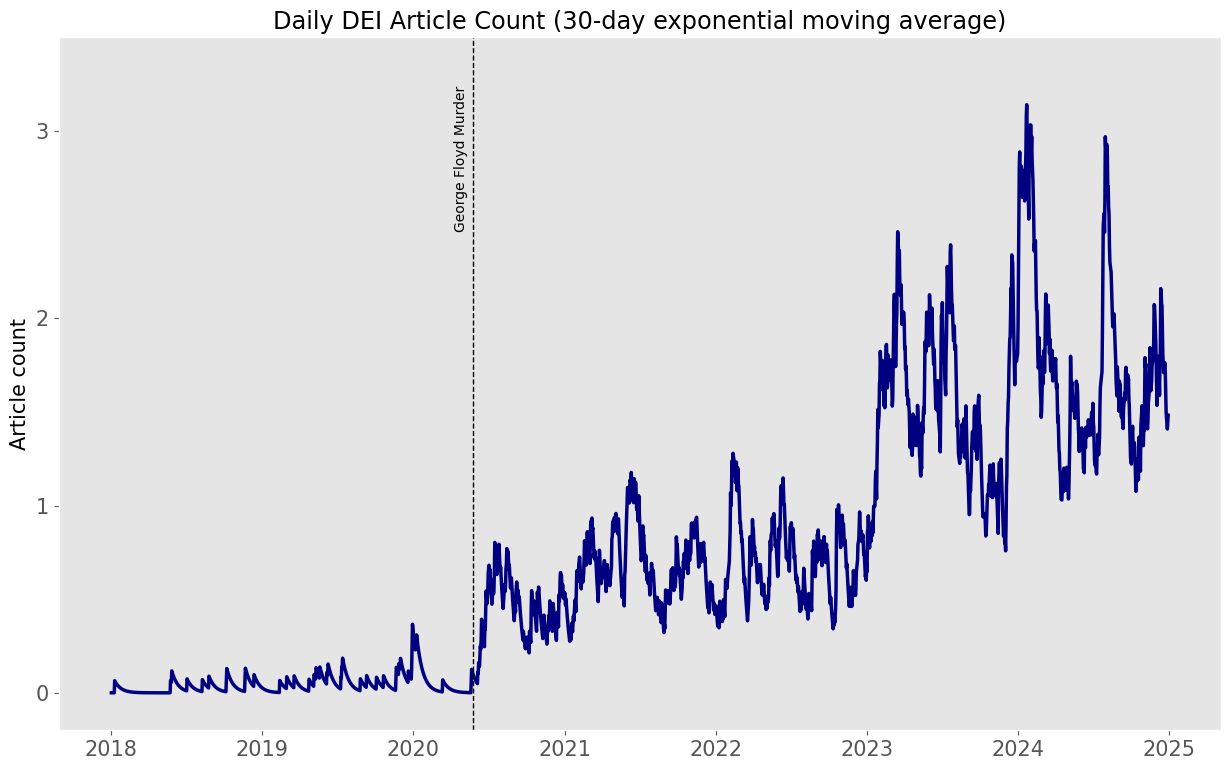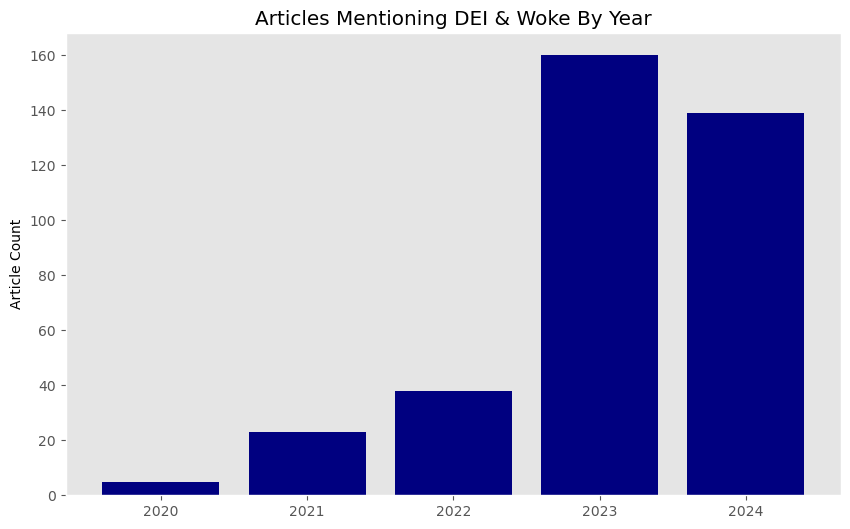DEI
From progressive policy to culture war buzzword

Diversity, Equity, and Inclusion, or as it is more popularly known, DEI, is not a new concept. Policies promoting these values have been around since the passage of the Civil Rights Act of 1964, but the term has only entered the public consciousness within the last five years. Though it was initially a neutral descriptor for diversity and affirmative action programs, over the last few years, DEI has become a culture war buzzword used by the right to attack the left’s social and political platforms.
How can we understand the evolution of DEI as part of culture war rhetoric in the media? To answer this question, we examined every article mentioning “Diversity, Equity, and Inclusion” or “DEI” in four major US newspapers (The New York Times, The Washington Post, The Wall Street Journal, and USA Today) from January 1, 2016 to December 31, 2024. There were only a handful of mentions of either formulation in 2016 and 2017, so to see when these phrases first gained traction in public discourse, we graphed all articles from 2018 to the end of 2024.

This shows that the phrases “Diversity, Equity, and Inclusion” and “DEI” became consistently relevant in US media only as of May 2020 in the wake of George Floyd’s murder. In that era, the conversation surrounding DEI was part of a larger societal focus on racial justice in American politics. Through at least late 2021, coverage mentioning Diversity, Equity, and Inclusion was mostly positive. For example, according to a New York Times article published in July 2020, DEI efforts were seen as “long overdue” by the Guggenheim board. In a New York Times article from June 2021, the mayor of Danville, Virginia, described DEI as a “powerful antidote to a society struggling with concepts like ‘cancel culture’ and ‘wokeness,’” suggesting that DEI was perceived as a meaningful, not performative, endeavor.
As early as 2021, however, glimmers of mounting opposition to DEI were beginning to show. In September 2021, for example, an article noted that DEI efforts “can often come off as a quick fix, a quantitative correction without much substance’” By late 2021, another article expressed fears over DEI contributing to a culture at universities that demanded faculty and students to “self-censor.” These concerns related to academic censorship and performative activism mirror the culture war issues that have exploded in recent years as DEI has become increasingly politicized.
One way to assess the rising skepticism and even weaponization of the term DEI in the media is by exploring its association with other culture war buzzwords. We do this by examining co-occurrences of DEI and “woke” — a term that, by 2020, had been thoroughly stigmatized by the right, despite its origins as a synonym for social awareness. We tracked articles that mentioned both DEI and “woke” together, observing a sharp increase in early 2023. This metric strongly suggests that media coverage of DEI had become decidedly more negative by early 2023.

To further illustrate the rising negativity linked to DEI, we look at the types of sentences that became more prominent in the last two years. In February 2023, for example, a Wall Street Journal author described DEI as a force at the “heart of the woke movement” that only serves to deaden “the academic mind.” Another article from November 2024 claimed that DEI was a “sanctimonious” example of “woke progressivism.” At their sharpest, we note that several articles from this time period linked DEI with the dramatically named “woke mind virus.”
The increasing politicization of DEI news coverage is also reflected in public opinion data. Despite the fact that a majority of Americans believed that programs promoting diversity in the workplace were important between 2021 and 2023, by November 2024, American employees were more likely to say that focusing on increasing DEI was “mainly a bad thing.” According to a March 2025 NBC survey, the effect was clearest on right-leaning respondents: 85% of Republicans supported the dissolution of DEI programs, whereas the same percentage of Democrats believed they should continue.
From 2020 to 2022, DEI was broadly praised and embraced as superior to culture war terms like “wokeness” and “cancel culture” — it symbolized a more meaningful form of activism. However, by 2023, DEI had become almost interchangeable in political discourse with these more negative buzzwords. The term “DEI” is only one example of many social justice terms, like intersectionality, critical race theory, and woke, that underwent a profound shift in their meaning as culture war rhetoric gradually took over in public discourse. If we want to understand how the egalitarian impulse behind the Civil Rights Act of 1965 transformed into President Trump’s 2025 executive order ending “radical and wasteful DEI programs within the federal government,” it is vital to pay close attention to the increasingly politicized language that has become rampant in our news sources.
—Daniza Tazabekova and Abby Ward
Methodological note: We examined all 1,855 articles containing “Diversity, Equity, Inclusion” or “DEI” published between January 1, 2016 and December 31, 2024 in The New York Times, The Washington Post, The Wall Street Journal, and USA Today. We tagged all articles that mentioned “woke” and variations such as “wokeness.” We used 30-day exponential moving averages to facilitate the interpretation of daily article counts. For additional information regarding our methods, see here. Photo Credit: Chip Somodevilla/Getty Images.